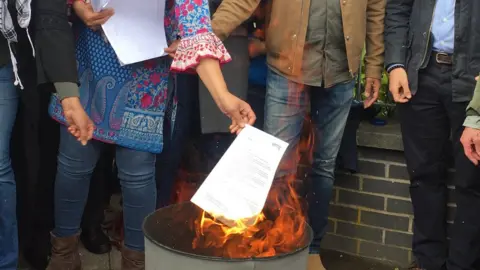Serco to 'pause' asylum seeker eviction lock-change plan
 BBC
BBCHousing provider Serco has said it will "pause" issuing lock-change orders to tenants refused asylum in the UK.
The contractor said it would not begin enforcing the orders until on-going court action had clarified its position.
Campaigners are challenging Serco's plans to evict 330 asylum seekers from their homes in Glasgow.
The issue has prompted days of demonstrations at a Home Office building by protesters in Glasgow.
'Negative decisions'
In a statement issued after the latest protests, Serco said it would "pause all further lock-change notices to other asylum seekers who have received negative decisions whilst the law is being tested and clarified".
It added: "This will also give stakeholders who support asylum seekers more time to prepare for what is likely to be an increase in the number of people seeking their help."

The Home Office maintains that those who have no right to remain in the country should leave the UK, and accommodation will only continue to be provided temporarily if there is a practical or legal obstacle to that.
The charity Shelter Scotland is to represent two of the asylum seekers at the city's sheriff court next week.
'Immigration lawyers'
Director Graeme Brown said: "Our legal team will be presenting papers to Glasgow Sheriff Court on Monday morning along with the legal services agency who act for a third individual to try and get interim orders that will prevent the lock changes threatened to our clients.
"Our clients are actively working with immigration lawyers to resolve their asylum claims. Interim orders temporarily stopping the lock changes will allow this work to continue with our clients having a home to live in."

Serco chief executive Rupert Soames had said lock-change notices would be given to no more than 10 people a week for the next four weeks.
He said none of these would be families with children and all would be people whom the Home Office considered to have exhausted the appeal process.
More than 100 campaigners, backed by charity Positive Action in Housing, the Church of Scotland and Glasgow Campaign to Welcome Refugees, have taken part in a third day of protests outside the Brand Street Home Office building in Glasgow.
During the demonstration protesters burned letters sent by Serco warning them that they would be evicted.
Campaigners against the planned evictions have said housing associations in the city could be crucial to their efforts.
'Our permission'
The charity Positive Action on Housing said it has been encouraged by the housing associations' response to the issue.
They said local associations had pledged practical help for the asylum seekers.
Campaigners hope the housing associations, which own some of the accommodation, can prevent tenants being made homeless.

Parkhead Housing Association said it has already explained its position to Serco.
Chief executive Jim Strang said: "We wrote to Serco to advise them that in terms of the lease we have with them, they can't change locks without our permission.
"We won't give that permission under the circumstances at the current time.
"We've also indicated to Serco and to the city council that we will - if their tenant in our property is evicted - we will rehouse them."
Robina Qureshi, the director of Positive Action in Housing, described the evictions as "immoral, irresponsible and frankly dangerous".
She said: "All our efforts this past week have been to avert a humanitarian disaster taking place on our streets as Serco slowly dumps 330 refugees and asylum seekers on to the streets of Glasgow with seven-day notices.
"These notices are being legally challenged in Scotland's highest court, the Court of Session."
